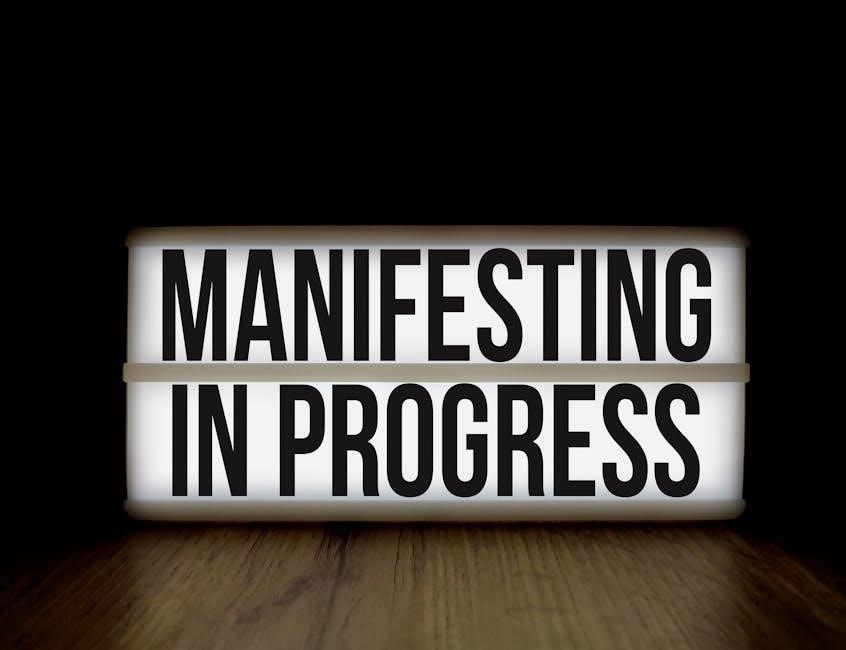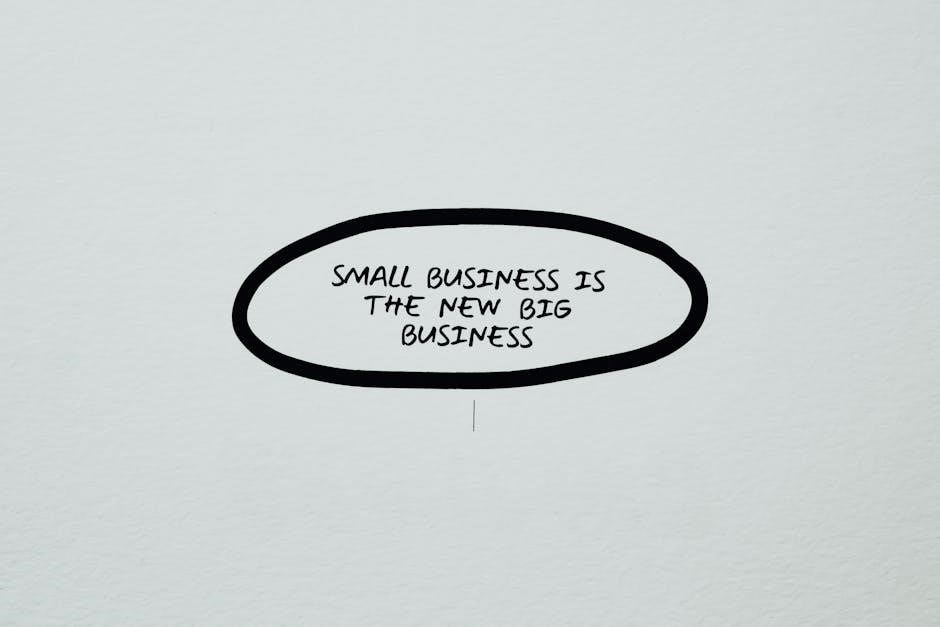Carol Dweck’s groundbreaking research introduced the concepts of growth and fixed mindsets, revealing how beliefs about intelligence and abilities shape learning, challenges, and success in life.
Overview of Carol Dweck’s Theory
Carol Dweck’s theory, introduced in her 2006 book Mindset: The New Psychology of Success, distinguishes between two primary mindsets: growth and fixed. She posits that individuals with a growth mindset believe abilities and intelligence can develop through effort and learning, while those with a fixed mindset view these traits as innate and unchangeable. Dweck’s research demonstrates how these beliefs profoundly influence behavior, particularly in challenging situations. Her work emphasizes the transformative power of adopting a growth mindset to foster resilience, innovation, and long-term success in personal and professional domains.
The Importance of Mindset in Personal and Professional Development
Mindset plays a pivotal role in personal and professional development, influencing how individuals approach challenges, learning, and growth. A growth mindset fosters resilience, adaptability, and lifelong learning, enabling individuals to embrace challenges and persist through obstacles. In contrast, a fixed mindset can limit potential by avoiding risks and stagnating progress. Professionally, a growth mindset drives innovation, collaboration, and leadership, while a fixed mindset may hinder career advancement and organizational success. Understanding and cultivating the right mindset is essential for unlocking personal and professional potential, as it directly impacts goal achievement and overall fulfillment in life and work.
Defining Growth Mindset
A growth mindset is the belief that abilities and intelligence can develop through dedication and hard work, emphasizing effort, persistence, and embracing challenges as growth opportunities.
Core Beliefs of a Growth Mindset
Individuals with a growth mindset believe their abilities and intelligence can be developed through effort, learning, and persistence. They view challenges as opportunities for growth rather than threats to ego. Key principles include embracing effort as a path to improvement, seeing failure as a learning tool, and understanding that progress, not perfection, is the goal. They also believe that talent alone is not enough; consistent practice and resilience are essential for achieving success. This mindset fosters a love for learning and a confidence in overcoming obstacles through determination and hard work.
How a Growth Mindset Impacts Learning and Development
A growth mindset significantly enhances learning and development by fostering resilience and a love for learning. Individuals embrace challenges as opportunities to grow, viewing effort and persistence as essential tools for improvement. They believe that abilities can evolve over time, leading to increased motivation and engagement. This mindset encourages learners to take risks, experiment, and persevere through setbacks, viewing failure as a valuable teacher rather than a source of discouragement. By focusing on progress rather than perfection, a growth mindset cultivates confidence, adaptability, and a lifelong commitment to personal and intellectual growth.
Defining Fixed Mindset
A fixed mindset is the belief that abilities and intelligence are innate and unchangeable, leading individuals to avoid challenges, view effort as unnecessary, fear failure, and resist growth.
Core Beliefs of a Fixed Mindset
A fixed mindset is rooted in the belief that abilities, intelligence, and talents are innate and unchangeable. Individuals with this mindset view success as proving their inherent worth, often avoiding challenges to prevent exposing weaknesses. They see effort as unnecessary if they are naturally gifted, and failure as a reflection of their inadequacy. Criticism is perceived as a personal attack, reinforcing their fear of not meeting expectations. This mindset fosters a focus on demonstrating existing skills rather than developing new ones, limiting growth and resilience in the face of obstacles.
The Limitations of a Fixed Mindset in Achieving Success
A fixed mindset imposes significant barriers to success by discouraging individuals from pursuing challenges and viewing failure as a reflection of inadequacy. Those with this mindset often avoid opportunities for growth, fearing that effort may expose their perceived limitations. They resist feedback and criticism, as these are seen as personal attacks rather than avenues for improvement. This rigid perspective stifles innovation, hinders personal development, and fosters a fear of not meeting expectations. By prioritizing the appearance of competence over actual progress, a fixed mindset ultimately limits potential and long-term achievement in both personal and professional realms.

Key Differences Between Growth and Fixed Mindsets
Growth mindsets embrace challenges, viewing effort as a path to growth, while fixed mindsets see challenges as threats, believing abilities are innate and unchangeable.
Beliefs About Intelligence and Abilities
A growth mindset believes intelligence and abilities can be developed through effort and learning, while a fixed mindset sees them as innate and unchangeable. Those with a growth mindset view challenges as opportunities to grow, embracing effort as a means to improve. In contrast, individuals with a fixed mindset often avoid challenges to protect their ego, fearing failure will expose shortcomings. This fundamental difference in belief shapes behavior, with growth mindsets fostering resilience and a love for learning, while fixed mindsets limit potential by prioritizing perfection over progress. These beliefs profoundly influence how individuals approach life’s obstacles and opportunities.
Attitudes Toward Challenges and Effort
Individuals with a growth mindset view challenges as opportunities for growth and learning, embracing effort as a means to improve. They believe that persistence and hard work can lead to mastery. In contrast, those with a fixed mindset often avoid challenges, fearing failure may expose their limitations. Effort is seen as unnecessary or even threatening if it doesn’t yield immediate success. This difference in attitude toward challenges and effort significantly impacts how people approach difficulties, with growth mindsets fostering resilience and progress, while fixed mindsets may lead to stagnation and missed opportunities for development.
Responses to Failure and Criticism
Individuals with a growth mindset view failure and criticism as opportunities to learn and improve, fostering resilience and adaptability. They analyze feedback to refine their approach, seeing setbacks as part of the growth process. In contrast, those with a fixed mindset often feel threatened by failure and defensive about criticism, perceiving it as a reflection of their innate abilities. This mindset leads to avoidance of challenges and diminished effort, hindering personal and professional development. The way people respond to failure and criticism deeply reflects their mindset, influencing their ability to overcome obstacles and achieve long-term success.

The Role of Mindset in Academic Achievement
Mindset significantly influences academic achievement by shaping how students view challenges, persist through difficulties, and approach learning opportunities, impacting their performance and motivation.
How Growth Mindset Fosters Academic Success
A growth mindset fosters academic success by encouraging students to embrace challenges, view effort as a path to improvement, and persist through obstacles. Students with this mindset believe their abilities can develop through dedication and hard work, leading to increased engagement and resilience. They are more likely to seek feedback, learn from failures, and adapt strategies to achieve their goals. This perspective not only enhances performance but also cultivates a love for learning, ultimately driving higher academic achievement and a stronger belief in their potential for growth.
The Impact of Fixed Mindset on Learning Outcomes
A fixed mindset significantly hinders learning outcomes by fostering a fear of challenges and a belief that abilities are unchangeable. Students with this mindset often avoid difficult tasks to prevent failure, limiting their opportunities for growth. They view effort as a sign of inadequacy rather than a means to improve, leading to disengagement and poor performance. Additionally, setbacks and criticism are perceived as threats, causing discouragement and a reluctance to adapt. This rigid perspective stifles progress, resulting in lower academic achievement and a diminished capacity to reach full potential compared to those with a growth-oriented approach.
Mindset and Professional Development
A growth mindset fosters innovation, resilience, and employee growth in the workplace, while a fixed mindset can hinder adaptability and limit career advancement opportunities.
Growth Mindset in the Workplace
A growth mindset in the workplace fosters innovation, adaptability, and continuous improvement. Employees with this mindset view challenges as opportunities to learn and grow, driving organizational success. Leaders who embrace a growth mindset encourage experimentation, feedback, and development, creating a culture of resilience and collaboration. This approach not only enhances individual performance but also promotes a proactive and solutions-oriented team environment. By prioritizing learning over perfection, organizations can unlock employee potential and thrive in dynamic industries. A growth mindset is essential for long-term professional development and sustainably achieving business goals.
Fixed Mindset and Career Limitations
A fixed mindset can significantly limit career growth by making individuals avoid challenges and fear failure. Those with a fixed mindset often believe their abilities are innate and unchangeable, leading to resistance to feedback and a reluctance to pursue new opportunities. This mindset can result in career stagnation, as individuals may hesitate to develop new skills or adapt to changing demands. Over time, this rigidity can hinder promotions and limit professional advancement. Recognizing and addressing these limitations is crucial for overcoming career obstacles and fostering long-term success in a rapidly evolving work environment.
Mindset in Personal Relationships
Mindset significantly influences personal relationships, with growth mindset fostering resilience, adaptability, and empathy, while fixed mindset may lead to defensiveness and resistance to change. Growth-oriented individuals embrace challenges and open communication, nurturing deeper connections. In contrast, those with a fixed mindset may avoid conflict or feedback, hindering relationship growth. By cultivating a growth mindset, individuals can navigate relationship dynamics more effectively, leading to greater understanding and satisfaction. Recognizing these patterns can help individuals develop healthier, more fulfilling personal relationships. Understanding mindset’s role is key to building strong, resilient connections. This insight empowers individuals to grow together, rather than apart.
Growth Mindset and Relationship Growth
A growth mindset fosters resilience and adaptability in personal relationships, enabling individuals to embrace challenges and view conflicts as opportunities for growth. People with this mindset approach relationships with curiosity and openness, seeking to understand their partner’s perspectives and grow together. They are more likely to communicate effectively, navigate disagreements constructively, and build deeper emotional connections. A growth mindset encourages empathy, mutual support, and a shared commitment to improvement, leading to stronger, more fulfilling relationships. By embracing challenges and viewing feedback as a tool for growth, individuals can cultivate meaningful and lasting connections. This mindset promotes harmony and understanding.
Fixed Mindset and Relationship Challenges
A fixed mindset often leads to relationship challenges, as individuals may resist change, fear failure, and avoid challenges that could strengthen their connections. They may view conflicts as threats to their ego rather than opportunities for growth, leading to defensiveness and a reluctance to adapt. People with a fixed mindset may struggle to embrace their partner’s feedback or perspectives, perceiving criticism as a personal attack. This rigidity can hinder emotional resilience, fostering an environment of resistance and frustration. Such challenges can escalate conflicts and prevent mutual understanding, ultimately undermining relationship growth and harmony.
Assessing Your Mindset
Carol Dweck’s assessment helps identify whether you lean toward a growth or fixed mindset by rating statements about intelligence, abilities, and perspectives on challenges and feedback.
Carol Dweck’s Growth vs. Fixed Mindset Assessment
Dweck’s assessment evaluates an individual’s mindset by presenting statements about intelligence, abilities, and responses to challenges. Respondents rate their agreement, helping identify growth or fixed tendencies.
The tool categorizes mindsets across traits like intelligence and effort, providing a score that reflects fixed, growth, or a mix. This insight aids in understanding strengths and areas for development, fostering personal and professional growth.
Interpreting Assessment Results
The assessment results categorize individuals into growth or fixed mindsets, with scores indicating the strength of each tendency. A higher score reflects a stronger growth mindset, while lower scores suggest fixed mindset traits.
Understanding these results helps identify areas for development. Those with fixed mindsets may benefit from strategies to embrace challenges and effort as growth opportunities. Conversely, individuals with growth mindsets can further nurture their approach to learning and resilience. The insights gained are valuable for personal and professional growth, guiding individuals to shift toward a more adaptive mindset.

Shifting from Fixed to Growth Mindset
Transitioning from a fixed to a growth mindset involves embracing challenges, viewing effort as essential for growth, and learning from failures to build resilience and confidence.
Strategies for Cultivating a Growth Mindset
Cultivating a growth mindset involves embracing challenges, persisting through obstacles, and viewing effort as essential for development. Practice self-awareness to recognize fixed mindset triggers and replace them with growth-oriented thoughts. Use specific, effort-focused praise to reinforce progress rather than innate abilities. Engage in continuous learning, seek feedback, and view criticism as opportunities for improvement. Foster resilience by reframing failures as stepping stones for growth. Surround yourself with supportive environments that encourage experimentation and learning. Over time, these practices can help shift your mindset, unlocking greater potential for personal and professional success.
- Embrace challenges as opportunities to learn.
- Persist through obstacles and setbacks.
- View effort as a key driver of growth.
- Seek and learn from feedback and criticism.
- Cultivate self-awareness to recognize and challenge fixed mindset beliefs.
Overcoming Obstacles in Mindset Shifts
Shifting from a fixed to a growth mindset can be challenging due to deeply ingrained beliefs and fear of failure. Recognizing these obstacles is the first step toward change. Self-awareness helps identify when fixed mindset tendencies arise, allowing intentional shifts toward growth-oriented thinking. Embrace challenges as opportunities for growth rather than threats to ego. Seek feedback openly and persist through setbacks, reframing failure as a learning experience. Surrounding oneself with supportive environments and role models can further facilitate mindset shifts. Consistent effort and patience are essential for fostering lasting change.
- Recognize and challenge fixed mindset triggers.
- Reframe failures as learning opportunities.
- Seek supportive environments and role models.
- Practice persistence and self-compassion during setbacks.

The Role of Education in Fostering Growth Mindset
Educators play a crucial role in fostering growth mindsets by encouraging effort, embracing challenges, and providing constructive feedback, thereby nurturing resilience and a love for learning.
Teachers’ Mindsets and Their Impact on Students
Teachers’ mindsets profoundly influence their students’ learning experiences. Educators with a growth mindset foster resilience, creativity, and a love for learning by emphasizing effort and progress. They encourage students to view challenges as opportunities for growth and provide constructive feedback that guides improvement. Conversely, teachers with a fixed mindset may unintentionally limit students’ potential by focusing on innate abilities rather than development. Their approach can discourage risk-taking and reinforce the idea that success is tied to talent, not effort. Cultivating a growth mindset among teachers is essential for creating an environment where students thrive academically and emotionally.
Creating a Growth-Oriented Classroom Environment
A growth-oriented classroom environment fosters resilience, creativity, and a love for learning. Teachers can create this by emphasizing effort, progress, and persistence. Encouraging students to embrace challenges as opportunities for growth, rather than avoiding them, cultivates a positive mindset. Providing constructive feedback that focuses on improvement rather than praise helps students understand that ability can be developed. Celebrating persistence and highlighting the value of effort over talent inspires students to take risks and view setbacks as stepping stones to success. This approach builds confidence and promotes a culture where learning is valued and enjoyed.
Mindset and Leadership
A growth mindset in leadership fosters innovation, resilience, and adaptability, while a fixed mindset can limit a leader’s ability to embrace change and empower others effectively.
Growth Mindset in Effective Leadership
A growth mindset in leadership fosters a culture of continuous improvement, innovation, and resilience. Leaders with this mindset encourage experimentation, embrace challenges, and view failures as opportunities to learn. They empower employees by focusing on skill development rather than showcasing innate talent. This approach cultivates adaptability, collaboration, and a shared commitment to growth. By modeling a growth mindset, leaders inspire their teams to strive for excellence, adapt to change, and achieve long-term success. Such leaders are better equipped to navigate complex environments and drive sustainable organizational growth.
Fixed Mindset and Leadership Limitations
A fixed mindset in leadership can hinder organizational progress by fostering a culture of stagnation and risk aversion. Leaders with a fixed mindset often believe their abilities are innate and unchangeable, leading to a reluctance to embrace challenges or admit weaknesses. This can result in poor decision-making, resistance to change, and a lack of investment in employee development. Fixed mindset leaders may prioritize appearing competent over fostering innovation, stifling creativity and growth within their teams. Such limitations can create a rigid work environment, ultimately undermining the organization’s ability to adapt and thrive in dynamic contexts.
Mindset and Emotional Intelligence
Mindset shapes emotional intelligence by influencing how individuals perceive and manage emotions. A growth mindset fosters resilience and adaptability, while a fixed mindset may create emotional barriers, limiting self-awareness and interpersonal skills.
Growth Mindset and Emotional Resilience
A growth mindset fosters emotional resilience by embracing challenges as opportunities for growth. Individuals with this mindset view effort as a path to progress, not failure, allowing them to adapt to setbacks and maintain motivation. This perspective enhances emotional intelligence by promoting self-awareness and perseverance. In contrast, a fixed mindset often leads to emotional barriers, as individuals may avoid challenges to protect their ego, limiting their ability to cope with stress and change. Cultivating a growth mindset, therefore, is crucial for building emotional resilience and navigating life’s adversities effectively.
Fixed Mindset and Emotional Barriers
A fixed mindset often creates emotional barriers by fostering a fear of failure and a reluctance to take risks. Individuals with this mindset tend to avoid challenges that might expose their perceived inadequacies, leading to missed opportunities for growth. This rigid perspective can result in heightened stress and anxiety, as setbacks are viewed as reflections of their fixed abilities rather than temporary obstacles. Over time, such emotional barriers can hinder personal development and overall well-being, making it difficult to cultivate resilience and adapt to changing circumstances. This contrasts sharply with the growth mindset, which embraces challenges as pathways to progress.

Neuroplasticity and Mindset Development
Neuroplasticity, the brain’s ability to rewire itself, supports mindset development by enabling new neural connections, fostering adaptability and continuous growth in individuals with a growth mindset.
The Science Behind Mindset Changes
Research by Carol Dweck and others reveals that mindset changes are rooted in neuroplasticity, the brain’s ability to rewire itself. A growth mindset activates neural pathways associated with learning, adaptability, and resilience, while a fixed mindset limits these connections. Studies show that embracing challenges and persisting through effort can strengthen neural networks, fostering intellectual and emotional growth. This scientific foundation underscores the potential for individuals to shift from a fixed to a growth mindset, enhancing their capacity for lifelong development and success in both personal and professional realms.
Neuroplasticity and Growth Mindset
Neuroplasticity, the brain’s ability to reorganize itself, plays a crucial role in mindset development. A growth mindset leverages neuroplasticity by actively creating new neural connections through learning and challenges. When individuals embrace effort and persistence, their brains form stronger pathways, enhancing problem-solving and adaptability. This biological adaptability supports intellectual and emotional growth, demonstrating that abilities are not fixed but can evolve over time. By nurturing a growth mindset, people can harness neuroplasticity to overcome limitations and achieve lasting development in both personal and professional spheres.
The distinction between growth and fixed mindsets, rooted in Carol Dweck’s research, highlights the transformative power of embracing challenges and lifelong learning for personal and professional success.
The Power of Mindset in Shaping Success
Carol Dweck’s research underscores that mindset profoundly influences achievement. A growth mindset fosters resilience, adaptability, and continuous improvement, enabling individuals to embrace challenges and view failures as growth opportunities. Conversely, a fixed mindset often leads to avoidance of risks and stifled potential. By cultivating a growth mindset, people can unlock their full capabilities, leading to greater success in academics, careers, and personal relationships. This mindset shift not only enhances individual potential but also creates a culture of learning and innovation, ultimately shaping a more fulfilling and successful life. Embracing this perspective is key to long-term achievement and personal growth.
Final Thoughts on Embracing a Growth Mindset
Embracing a growth mindset is a powerful step toward personal and professional growth. It encourages resilience, innovation, and lifelong learning. By viewing challenges as opportunities and persisting through setbacks, individuals can unlock their potential. A growth mindset fosters creativity, collaboration, and adaptability, essential in today’s dynamic world. Conversely, a fixed mindset limits progress by fearing failure and avoiding risks. Shifting to a growth mindset requires self-awareness, effort, and perseverance. Ultimately, it empowers individuals to thrive in an ever-changing environment, leading to greater fulfillment and success. Cultivating this mindset is a commitment to continuous improvement and unlocking one’s full potential.